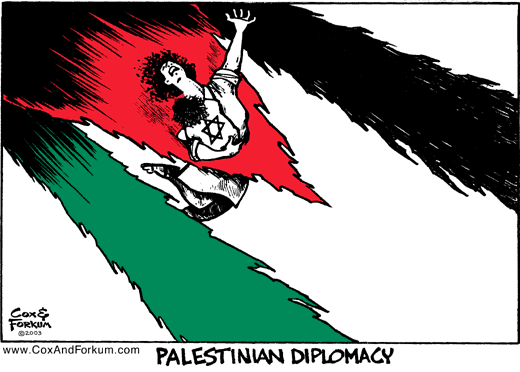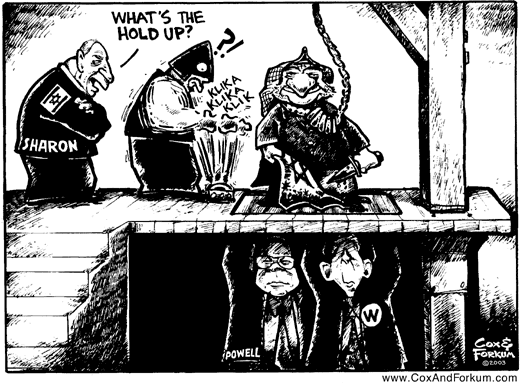In the preceding sections, we have evaluated the Bush administration’s approach toward America’s enemies, and the supporters of its enemies. In these categories, we have found that while the United States has taken some extremely limited steps to defend itself, it has failed to do so against its most dangerous enemies. In some cases, it has even offered to assist these enemies. This disregard for its interests has, unfortunately, carried over into America’s treatment of its friends.

In wartime, the assistance of allies is very valuable. Great Britain and Australia have contributed significantly to the American war effort, and for this we can only extend our gratitude. But while gratitude has been extended publicly by the administration to these allies, the same is not true for another crucial ally: Israel. Not only has the United States failed to thank Israel publicly for its friendship, but it has also worked actively to undermine this friendship, by pressuring Israel to restrain itself in its war against Palestinian terrorists. Israel’s war, however, is but a microcosm of the wider war between the West and Islamic terrorism. For this reason, America’s restraint of Israel is not simply ironic, but self-defeating.
Because American policy toward Israel has been so self-defeating, we judge American relations with Israel to have reversed any progress in the current war it may have made. For this reason the Bush administration receives a plain and simple F for its Israel policy.
The context for the current American relationship with Israel began in 1993, when the Oslo agreement between Yasser Arafat and Yitzak Rabin created the Palestinian Authority (PA), for the first time giving Arafat official, internationally recognized control over small patches of the occupied territories. Through the rest of the 1990s the primary result of this newfound Palestinian autonomy was an ever-increasing campaign of suicide bombings against Israeli civilians. After each bombing the United States would encourage restraint, for the sake of protecting the “peace process.” After each encouragement, a “cease fire” would be declared–which would then be broken promptly by the Palestinians.
Beginning in 2001, Israel began a series of occupations and reoccupations of the West Bank in an effort to stem the tide of suicide bombers. Most recently, after another series of withdrawals encouraged by the Americans, and a series of subsequent Palestinian attacks, Israel reoccupied and blockaded major Palestinian towns in July of 2002, resulting in the capture of over 140 suicide bombers and a six week-long lull in bombing.[48] As if this had not proven the efficacy of Israeli occupation in preventing further attacks, American pressure mounted again for further Israeli withdrawals. Naturally the beginning of the withdrawals brought with it further Palestinian attacks.
At this point Israel decided that the American peace process had gone far enough, and justifiably refused any further negotiations with Yasser Arafat. In response, the United States proposed a diplomatic gimmick that it hoped would rejuvenate the “peace process.” Amid further Palestinian attacks and Israeli reprisals, President Bush declared his intention to draw up a “road map” for peace, on the condition that Yasser Arafat appoint a new Palestinian Prime Minister and cabinet, to assume nominal control over the PA and provide an acceptable negotiating partner for the Sharon government. In March, Arafat yielded, nominating his long-time PLO deputy, Mahmoud Abbas to fill in as prime minister. With the ascension of Abbas, the US released its “road map,” for the first time ever calling for the eventual establishment of a Palestinian state. To achieve this goal, the PA was to begin to crack down on Palestinian terrorist groups, while Israel was to end Jewish settlements in the occupied territories.

But although it used different names–a “road map” instead of a “peace process,” and Abbas instead of Arafat–the latest American imposition is essentially the same as every previous “peace” initiative in its restraint of Israel and empowerment of the PA. Mahmoud Abbas differs from Arafat only in his degree of outright opposition to Israel: rather than advocating violence, Abbas has taken a more pragmatic line, arguing that Israel cannot be defeated militarily and must instead be undermined politically.[49] True to form, once in office, Abbas began by doing nothing to uphold the PA’s end of the bargain. He openly declared that he had no intention of cracking down on militants, insisting that this action would result in a civil war ; he would attempt “persuasion” instead.[50] Not surprisingly, this attempt at persuasion accomplished little, and Palestinian attacks continued though May and June. And despite the formal declaration of a three-month cease fire by major militant groups on June 29th, the violence continued, with suicide bombings following on July 8th, August 12th, and a particularly deadly one on August 19th. Because of the scale of the most recent bombing, Abbas had taken some perfunctory steps to crack down on militants, but because Arafat continued to fight to retain control over most of the PA’s security forces, there was little Abbas could do if he wanted to.[51] This underscores the fact that Abbas’ figurehead position had been manufactured by the United States merely to create the appearance of diplomatic progress, but represented no real change in Palestinian politics. Abbas has now resigned, and the administration finds itself back at square one.
The American restraint of Israel is particularly paradoxical in light of America’s own war against militant Islamic terrorism. The United States would never deign to negotiate with Osama bin Laden, and yet it demands that Israel negotiate with the terrorist Yasser Arafat, or his stand-ins. Arafat and his PLO cronies were the inventors of modern terrorism, and the murderers of countless Israelis (and some Americans). Even in his internationally-approved position in the PA, it is probable that Arafat continued to support Palestinian terrorist groups. As recently as November, Israeli forces operating in Gaza discovered evidence linking the PA to the construction of an explosive factory, likely to be used to build suicide bombs.[52] Arafat’s longstanding relationship to Fatah, the parent organization of the suicide-bombing Al-Aqsa Martyr’s Brigade, makes it difficult to believe that Palestinian attacks have been planned and funded without his knowledge. Arafat may have become more politically suave, but he is, at heart, the same terrorist he always was.
Prior to the August 19th suicide bombing, American policy toward Israel had become even more audacious than simply pressuring Israel to negotiate with the PA. It has instituted an unprecedented program of direct economic aid to the PA.[53] And it had even opposed the seemingly minimal step Israel had taken to defend itself in the absence of future occupation of the territories: the construction of a simple security fence. It was only with the deadly August 19th bombing that the United States temporarily regained its senses, and backed away from the worst of its demands for Israel.
But a temporary relapse of sanity is not enough to protect Israel against its enemies. In truth, Israel should be permitted and even encouraged to end the Palestinian Authority. Under Arafat’s control of the PA, the Palestinian territories have become a haven and base of operations for terrorists launching attacks against Israel. As such the very existence of the Palestinian Authority is a threat to Israel, and it deserves to be destroyed, whether or not every one in the PA bureaucracy is complicit in terrorism.

Arafat’s regime is also a fledgling dictatorship, suppressing the rights of even his own Palestinian citizens. As a dictatorship, it is therefore in the nature of the PA to pose this threat to Israel, and not simply an accident of its current leadership. In any government based on the principle of rule by force, the most forceful gangs will call the shots. Even if Arafat were miraculously removed from his position, there would be no obvious replacements who could combat the Palestinian culture of gang-terrorism. The only hope for the reform of Palestinian culture is the relative freedom Palestinians would enjoy under full Israeli occupation: the freedom of speech, political dissent, and economic interaction with Israel that Palestinians did enjoy prior to the creation of the PA.
Nonetheless, the Bush administration has claimed that the establishment of a Palestinian state is necessary for peace between Israel and the Palestinians. This claim flies in the face of all of the evidence of PA complicity in terrorism, and can only come from the premise that the key to peace is the appeasement of aggressors. Give the Palestinians what they want, goes the argument, and they will leave Israel alone. But as with appeasement of aggressors throughout history–whether of Hitler in 1938, or of North Korea in 1994–granting the demands of aggressors only emboldens them further. It should come as little surprise, in this regard, that maps in Palestinian schools show all of Israel as a part of “Greater Palestine”: there can be no question that the ultimate goal of Arafat and his ilk remains the destruction of the state of Israel–and the creation of a Palestinian state would only bring the achievement of that goal one step closer.
Leaving aside the intentions of the Palestinians, however, the Bush administration also argues that the creation of a Palestinian state is necessary for peace throughout the Middle East, and a precondition for any further action in the war against militant Islam. But this argument only substitutes the appeasement of Iran, Saudi Arabia, and others demanding a Palestinian state, for appeasement of the Palestinians. Further, it is not true that Israeli-Palestinian “peace” is necessary for solving other problems in the Middle East. Quite the contrary: only by winning the war against nations such as Iran and Syria, and instilling reform in Saudi Arabia–the major sustainers of Palestinian terrorism against Israel–can Israeli-Palestinian peace be made possible.
The United States has no obligation to support Israel as an end itself. Its primary moral obligation is to defend its own citizens against foreign threats. Even from this perspective, however, the United States is obliged to permit Israel to defend itself, because Israel’s battle is the same as America’s. To begin with, the enemies of Israel are also the enemies of the United States. Terrorist organizations traditionally aligned against Israel, such as Hezbollah, have openly declared war against the West,[54] while traditionally anti-American groups, such as Al Qaeda, have entered the war against Israel (e.g., the November Al Qaeda attack on Israeli tourists in Kenya). Also, Israel’s intelligence in opposing these groups, and other governments in the region, continues to be indispensable. But most of all, Israel is America’s natural ally in the war against militant Islam, because it is the only outpost of freedom and Western civilization in the Middle East. For this Israel deserves our strong moral support, including our support for its right to defend itself.
And yet the Bush administration has not offered this moral support. Through its imposition of the “peace process,” it has actually worked to undermine Israeli self-defense. It is one thing not to do everything one can to oppose one’s enemies, but it is quite another to sacrifice one’s own friends to pacify these enemies. The obscene injustice of America’s policy of restraining Israel against vicious Palestinian terrorists casts a pall over the entirety of its war on terrorism.
Cartoons by Cox and Forkum.
References:
[48] “Israel has caught 140 bombers.” Jerusalem Post. August 6, 2002 < http://www.jpost.com/servlet/Satellite?pagename=JPost/A/JPArticle/ShowFull%26cid=1027506458947>.
[49]“Abu Mazen: a political profile.” Middle East Media Research Institute Special Report. April 29, 2003
[50] “Abbas to try persuasion, not force, with militants.” Daily Star (Lebanon). June 5, 2003; “PA Gaza security chief: we will disarm no Palestinian.” Jerusalem Post. May 11, 2003 < http://www.jpost.com/servlet/Satellite?pagename=JPost/A/JPArticle/ShowFull%26cid=1052622190933>.
[51] “Arafat outmaneuvers Abbas on road map.” Ha’aretz. May 5, 2003 < http://www.haaretz.com/hasen/pages/ShArt.jhtml?itemNo=290222&contrassID=2&subContrassID=1&sbSubContrassID=0&listSrc=Y>.
[52] “Secret paper shows PA trying to build explosives plant.” Ha’aretz. November 24, 2002 < http://www.haaretzdaily.com/hasen/pages/ShArt.jhtml?itemNo=233900&contrassID=1&subContrassID=0&sbSubContrassID=0>.
[53] “White House Weighs Direct Aid for Palestinian Leadership.” New York Times. July 1, 2003 < http://query.nytimes.com/gst/abstract.html?res=F00A11F63E5E0C728CDDAE0894DB404482>.
[54] “Hezbollah calls for global attacks.” Washington Times. December 4, 2002.
Related Articles in Series:
- America’s Failing War Effort (Part 1 of 12): A Report Card
- America’s Failing War Effort (Part 2 of 12): Iraq
- America’s Failing War Effort (Part 3 of 12): Afghanistan
- America’s Failing War Effort (Part 4 of 13) The Cold War Against “The Axis of Evil”
- America’s Failing War Effort (Part 5 of 12): North Korea
- America’s Failing War Effort (Part 6 of 12): The Breeding Grounds
- America’s Failing War Effort (Part 7 of 12): Saudi Arabia
- America’s Failing War Effort (Part 8 of 12): Pakistan
- America’s Failing War Effort (Part 9 of 12): Israel and the Palestinians
- America’s Failing War Effort (Part 10 of 12): Military Deployment and Readiness
- America’s Failing War Effort (Part 11 of 12): International Law and Diplomacy
- America’s Failing War Effort (Part 12 of 12): Conclusion
